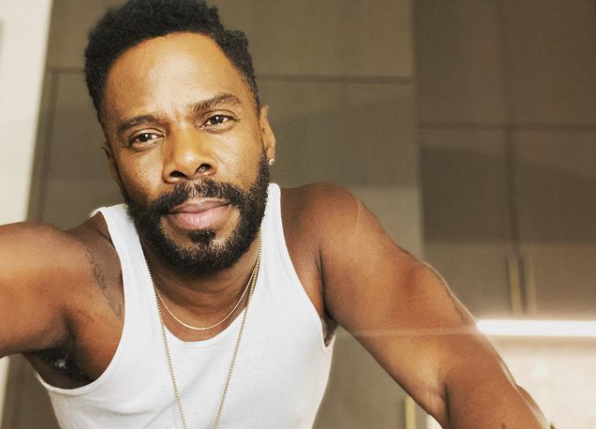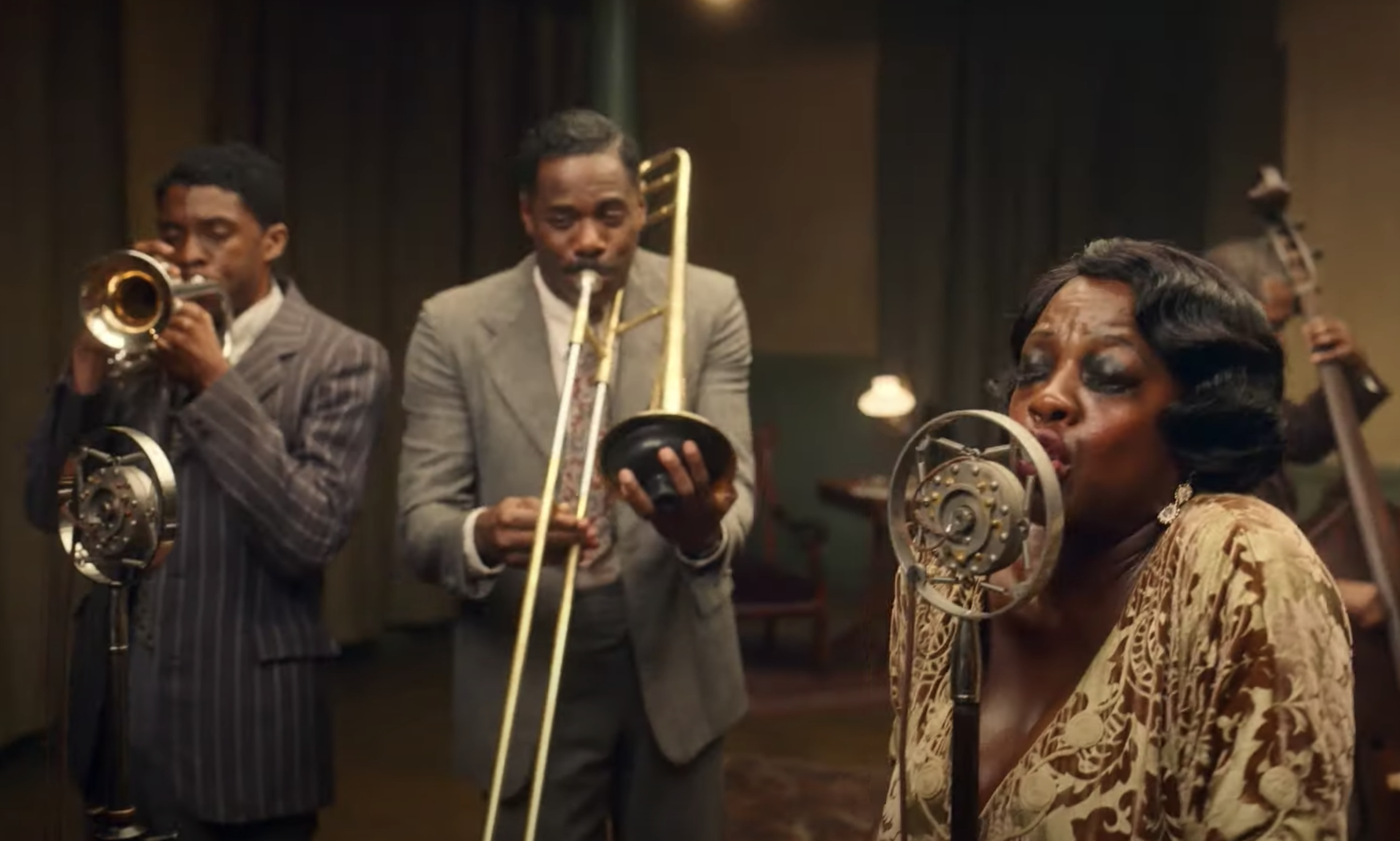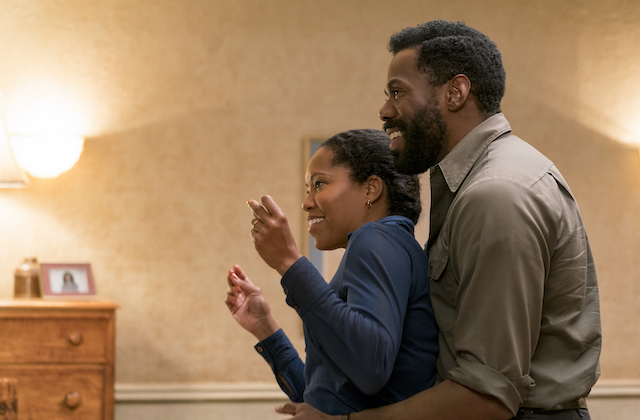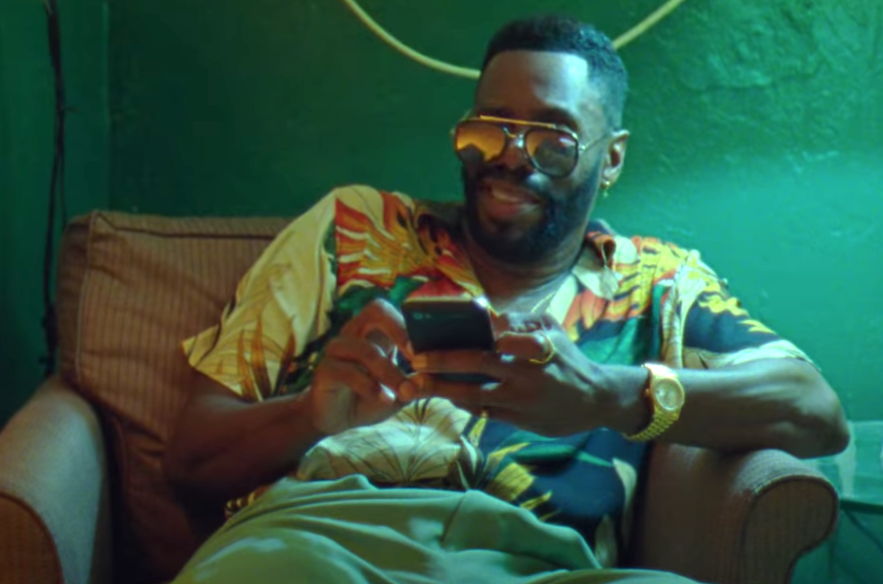Interview: Colman Domingo on "Ma Rainey's Black Bottom" and his slow burn career
 Monday, April 5, 2021 at 6:00PM
Monday, April 5, 2021 at 6:00PM This interview was originally published in an abridged version at Towleroad
 a recent image from Colman's instagram
a recent image from Colman's instagram
by Nathaniel R
Colman Domingo’s laugh is everything you hope it could be. Big, throaty, warm. It’s probably a little disarming for those who haven’t seen the full estimable range of his work and only know him from one of his tougher roles, like AMC’s zombie series Fear the Walking Dead. I first met him off the clock at a bar during the Toronto Film Festival a few years ago. Though I don’t usually approach celebrities in non-work circumstances I risked it if only to express appreciation (actors who’ve always been out of the closet deserve our respect). We ended up chatting over a drink. When I bring this chance meeting up, rather than shrugging off the awkward familiarity Colman begins to laugh. “We sure did!” he says enthusiastically before drifting into a familiar conversation — as so many of us have now — about how much he misses meeting and hugging people in person.
We spoke over Zoom in February, almost a year into the pandemic...
Despite the shut-down which derailed plans for so much of Hollywood, he hasn’t really stopped working. He’s one of the industry’s most popular character actors and also writes and has been developing TV projects. “I’ve always been the artist that’s like ‘Oh, okay. If that’s not working out, what else am I getting into?” he explains. “I don’t just sit and pause.’ He jumped back in front of cameras as soon as he could filming episodes of Bottomless Brunch at Colman’s and shooting a special two character episode of HBO’s Zendaya-led drama Euphoria. After that it was filming season six of Fear the Walking Dead. We talked about working with Chadwick Boseman on his last film, Colman’s reliable magic with female co-stars, his take on awards season, and his next buzzy projects.
 Ma Rainey's stars from left to right: Chadwick Boseman as Levee, Colman Domingo as Cutler, and Viola Davis as Ma.
Ma Rainey's stars from left to right: Chadwick Boseman as Levee, Colman Domingo as Cutler, and Viola Davis as Ma.
[This conversation has been edited and condensed for clarity.]
NATHANIEL: First of all, congratulations! This season you’ve received a SAG “cast” nomination, and NAACP and Spirit Award nominations for Best Supporting Actor. It’s been quite a ride with Ma Rainey’s Black Bottom.
COLMAN DOMINGO: That’s nice, right? I’ll take it, yeah. As we know, a lot of times good work or the work that you put into it is not recognized. And so it’s nice when it is.
Most people think of consistently working actors as “famous” and showered with prizes, etcetera but most aren’t. Really. You’ve been at this a long time.
COLMAN DOMINGO: No, they’re working. They’re just working actors. I’m a working stiff [Laughter]
Awards season is a strange thing. Have you seen the films in competition this year?
COLMAN DOMINGO: Yes. I'm a member of the Academy so I have to do my due diligence and watch a lot of the films. I hit the pause button for a moment because you need some perspective -- you start to think, 'do I not like anything?' [Laughs] I'm very critical of film. I'm critical about representation, critical about the lens that films are seen through. I'm critical about criticism.
We're in the middle of awards season. If I'm awarded something, wonderful. If I'm not awarded something, that's fine too!
Healthy stance.
COLMAN DOMINGO: I'm invested in the work, but if somebody needs me to be the winner of some award and that's going to move the needle and help green light one of my projects? So be it! But I'm not going to crawl under a rock if I don't get it. Is my work lessened because someone else's is elevated? Absolutely not. I think I have a pretty healthy ego about my own work. I take it all with a grain of salt. I'm probably the most mellow. I think I was cleaning up around the garden or taking out the trash when I heard [about the nominations]. If I was waiting by the computer I don't know what that will do to me. I'm very proud that any of the work that I'm a part of is recognized. Truly. I'm very excited about that. But you know, at the end of the day, I still have to take out the garbage. [Laughs]
You started on the stage so did Ma Rainey feel like coming home in a way.
COLMAN DOMINGO: Absolutely! I haven’t been on stage in maybe six years so it did feel like a homecoming in a way. I love that we honored its theater roots, which is giving us a full rehearsal period where we’re able to do dramaturgical work. Every part of it just felt like it was in my wheelhouse.
 If Beale Sreet Could Talk's marrieds, Regina King and Colman Domingo
If Beale Sreet Could Talk's marrieds, Regina King and Colman Domingo
I have to ask about your amazing rapport with your female costars. Your marriage to Regina King in If Beale Street Could Talk had so much texture. And in Ma Rainey’s Black Bottom the authenticity of this working relationship with Viola. Cutler is constantly mediating and trying to please her, but you can tell she also respects him. It’s so precisely drawn.
COLMAN DOMINGO: I love that because it is a very complicated relationship. He has his power but his power is attached to Ma’s power. Out of everyone, she trusts him the most and trust him to be her proxy when she’s not in the room and do her bidding. And so I think that he knows he owes his power to Ma’s power, but even with that, his job is to make sure that Ma is seeing every point of view, So I’m the one that has to go in for the tough conversations, to be thrown to the wolves, but that’s the job.
That one scene that we did together was so special for us because there was a level of vulnerability that Ma allows herself with him that she does not allow with anyone else. I knew at some point we had to touch, I just knew that. So I was like, ‘George and Viola, is there some way that they can just touch? It shouldn’t be a whole moment. Brief. Something to reveal that Ma was a bit more kindhearted and warm than she is on this day.’ Cutler knows Ma as a good time. He knows her as, you know, someone who is soft and gentle, but she just can not allow herself to be that on this day because she had so many systems up against her, challenging her music, her musicianship, the way she does things. Cutler can get her to a tender space. And I know there was a moment where she slapped my hand after she says, you know, ‘that’s all right by me.’
 a tender moment with Ma (Viola) and Cutler (Colman) in Ma Rainey's Black Bottom
a tender moment with Ma (Viola) and Cutler (Colman) in Ma Rainey's Black Bottom
I wish there was an edit that shows when the other characters come back in. We made a choice to just immediately take our hands away. Cutler wants to make sure that Ma is never seen as vulnerable to the rest of the band. You don’t get to see this part!
Loved that scene. Basically my point in asking about the rapport is that if I was an actress and I needed a male co-star I would demand you. You bring out such interesting things in your scene partners whether it’s Zendaya, Regina, Viola…
COLMAN DOMINGO: I know that they, they ultimately trust me. They know I’m a feminist times a hundred and they know that I want to take care of them as well. There’s nothing that I think that we can’t do together because I always put a safe space around them so they can be their full selves.
All of these interpersonal dynamics, are these intuitive things or are you having intense conversations with your costars to create them?
COLMAN DOMINGO: I think a lot of it is intuitive. The level of actresses that I’m able to work with are so high feeling, so high thought interrogation that they’re very open. They can see what you’re going to bring. I will say with Regina King, we didn’t have huge conversations about that marriage. All I knew was in our text that they were equals. That he lived in a house that was dominated by females and that he was very much a feminist, whether he could acknowledge it or even give words to that. He helped raised strong women and was married to a strong woman who went to Puerto Rico on her own in the seventies, while he did the nurturing at home. It’s unique when it comes to looking at African-American experiences.
Have you felt your career shift suddenly or has this all been gradual for you since, say, the Tony nomination for Scottsboro Boys.

 Colman first caught attention in two Broadway musicals, Passing Strange and Scottsboro Boys
Colman first caught attention in two Broadway musicals, Passing Strange and Scottsboro Boys
COLMAN DOMINGO: It was always the slow crawl. I got some attention in New York [in 2008] when I did Passing Strange. I know I was seen as a character actor that was sort of outside of the box being an African-American man. I think you can’t really think of the African-American Gary Oldman or the African-American Daniel Day Lewis. You know what I mean? I can. I can think of Harry Belafonte Jr. and some of his roles which are incredible — I’ve always likened myself to be one of those actors, which may take a little longer to get some traction because, you know, we shape shift and become different people. They can’t really pin me down. ‘Oh, Colman does that.‘
Now I think they see. ‘Oh, he can transform.’ To be honest, when I was nominated for a Tony for Scottsboro Boys [afterwards] I wanted to make sure that I wasn’t seen as a musical theater guy because that’s not what I do. I just happened to be in that musical doing character work. I can sing and I can dance, but I would never consider myself a Norm Lewis or a Billy Porter.
Right.
COLMAN DOMINGO: So I pulled away and did small plays after that. I’ve always been careful to sort of craft my own career and narrative. I think that’s why the ride is a little longer.
That makes sense.
 A special quarantine episode of Euphoria was a duet between Colman and Zendaya
A special quarantine episode of Euphoria was a duet between Colman and Zendaya
COLMAN DOMINGO: The succession of films, recently. I guess the blessing is I know for sure, if I don’t know anything else, that people have been watching my work for years and wanting to make spaces for me in their films and television projects. So the things that I’ve gotten into recently were all offers. They were all people who saw what I could bring to a project, not only as an actor, but as a thinker, and as a creative. People would just say, ‘Hey, Colman, what do you think about this scene? What thoughts do you have? And I can rewrite it in some way.’
It actually makes sense to me that I’ve never just ascended to like a Marvel Universe or something like that. People don’t know what to do with me, but I think now they’re getting an idea because they keep seeing me playing these varied roles. If Beale Street Could Talk was very seminal in my career. People were actually able to see me, in my fullness, of what I bring. And then shows like Euphoria and Fear of the Walking Dead. And you know, I still write musicals and plays. People are finally getting it that I do everything. They’re not trying to put me in a box.
This was my next question. Since you’re a writer, too, do you foresee yourself writing your own starring vehicle, like Radha Blank just did with The Forty-Year-Old Version?
COLMAN DOMINGO: Absolutely. Radha and I have been comrades for years. I directed her in her first solo show and we all come from the same ethos when it comes to creating. I’ve always been a writer, director, producer AND actor. You do what’s necessary. I have a couple of my plays that I’ve been thinking of adapting it to films, but I’m not a person that feels like I’ve got to write it and direct it and be in it. I like the collaborative process.
 Colman and his husband Raul, photographed for GQ's Modern Lovers issue last month
Colman and his husband Raul, photographed for GQ's Modern Lovers issue last month
Hollywood has been making strides around increased diversity and representation these past few years. The change is even beginning to happen for gay actors but you’ve been out for years. Have you felt this shift?
COLMAN DOMINGO: To be honest, Nathaniel, I’ve always had my nose to the grindstone actually creating work in all these different mediums. So I feel like I didn’t have a chance to really notice the broad strokes of the industry. Again, I’ve always been out and I’ve always been a multi-hyphenate. Anytime work wasn’t available, I was creating it. So I didn’t know that there was a lack of an opportunity in some way, you know what I mean? [Laughter]
But I do recognize that this is a great time for African-American artists and also openly gay artists. I think it’s going to be very interesting to see. I know that there are not many people like me who are openly gay and play straight roles all the time. I know that I’m an anomaly in that way. I look forward to when there’s more of me. I think you have to be fearless in believing that you can — that it can be about the work and not about who you go home to.
I would be remiss if I didn’t ask about Chadwick Boseman. Awards season has been justifiably filled with tributes. But you have such an antagonistic relationship with him in the movie. What was that like to play?
 arguing with Levee (Chadwick Boseman) in Ma Rainey
arguing with Levee (Chadwick Boseman) in Ma Rainey
COLMAN DOMINGO: The funniest thing is the cuts that have made it into the film were tempered down just a bit. There are some takes where I was just so on his ass and just hammering him. We wanted to find that balance where it was not just antagonistic. You’re antagonistic because you want to understand or be understood or to love someone more. Even the antagonism comes from respect. What do you do to someone that you hold in high esteem and respect? You try to tear them down a little bit, to make them a bit more human.
These are the levels we were playing. Chad and I had known each other since New York theater and been comrades for a long time. We were always excited to work with each other, and this was our first chance to really work with each other. We’re both Sagittarians and we were born one day after each other. And we understood each other in some way. So we were just inventive and playful. I had the time of my life working with Chad, even in those very heavy duty scenes.
I only met him once, but, it was funny because it was about two weeks before the announcement came that he had been cast as Black Panther. He was super friendly, but cagey with any question that was future-career based. Looking back it was so clear that he was definitely not allowed to mention Black Panther but it was fresh in his mind.
COLMAN DOMINGO: But also I think Chad was kind of like that as a person! He just wasn’t boastful about anything ever. I remember I saw him at a huge event where he was the King of Hollywood. He was Black Panther and he was surrounded by, like 20 people, — agents, managers, you name it — and I sort of go in there. I’m like, ‘Chad, I’m so proud of you. Congratulations.’ And he was like, telling everyone ‘that guy is the truth. You need to keep your eyes on Colman Domingo!’ He was always like that. He was always putting the attention on to his friends and comrades and elevating them, elevating us.
That’s surely one of these reasons he was magic in ensembles. Even Black Panther. That’s such a star role but at the same time he made it about community so you’re always thinking of all the other Wakandans.
Okay tell us about your next three movies!

 Colman and Taylour Paige as pimp and stripper in "Zola"
Colman and Taylour Paige as pimp and stripper in "Zola"
COLMAN DOMINGO: Zola is up next I think. Zola was a great big success at Sundance in 2020 but because of the pandemic we had to put off the release. It stars Taylour Paige, Riley Keough, Nicholas Braun and me.
It’s your reunion with Taylour!
COLMAN DOMINGO: Which is wild because we shot Zola before we shot Ma Rainey! It’s a complete swing of our characters in Ma Rainey. People’s heads are going to explode. She plays a stripper in Tampa and I play a lowdown dirty pimp. You don’t want to like him, but you do like him. He’s doing terrible things, but you’re going to enjoy the ride.
And after that Without Remorse with Michael B. Jordan. I play a priest in that one. And then of course I have Candyman, written and produced by Jordan Peele, and directed by Nia de Costa. I play a guy who has a bunch of secrets about the Cabrini Green projects in Chicago. It’s about gentrification. It’s about Black trauma. Jordan wrote that role for me.
That must be very flattering.
COLMAN DOMINGO: Are you kidding me? Yeah, absolutely! If you want a specific type you’re not going to run and offer me — I just know that that’s not my thing. You have to know that like, ‘Oh, we want to Colman Domingo to get in here and play with us and figure it out!’ I finally realized after thirty years that that’s exactly who I am. [Laughter]



Reader Comments (11)
Great conversation!!!! Thank you.
My secret is out! (j/k)
Phrasing, Colman, phrasing!
About 20 years ago, I had the joy to see Colman Domingo in a marvelous production of August Wilson’s Fences at a regional theater. Everyone was great, but obviously I found Domingo unforgettable. He worked frequently in the City by the Bay then. I saw him a few times, but his performance as Gabriel is the one that lasts.
Gabriel is a difficult role to play. He is left damaged by his service in the armed forces. His older brother Troy takes Gabriel’s $3,000 payment from the US government to buy a home for both Gabriel and Troy’s family. At the end of the play, Gabriel performs and allows an emotional release in honor of his deceased brother.
I still remember the moment. Domingo evoked this powerful truth that shared the conflicting emotions of mourning and celebration. What an actor!
Congrats, Nathaniel, for a well-thought-out interview. It's lovely to get to know Colman, in that he's been part of so many things, and is now getting more recognition. I can't do anything with Walking Dead, but otherwise, I'm on board with Colman.!
He's so great and I hope his profile continues to rise. I thought he was excellent in Ma Rainey's and I'm still confused by the lack of awards/critics love for him this season.
Joe G -- well i am confident that he'll get the attention one day. All it takes is one role and then things shift and you become default and get nominated for things you dont even deserve to be up for ;) ... also for character actors it's really hard since half of supporting categories now honor the stars.
Ready to bang the FYC drum for his performance in ZOLA!
Love him! I’m so glad to see his star rising. Great interview!
Some comments aren't going through moderation despite not being a troll, imposter or anything negative.
alex -- right? it looks like a good part. cant wait to see this movie.
anonymous -- those who wish to remain anonymous can just make up their own screen name. The problem is that using someone else's screen name is not being anonymous. it's just mean and causing confusion.
i have to err on the side of caution once Oscar season is over and i have more free time i will install a new commenting system so that people have to register. It's the only way i realize since people cant control themselves in the current "open" system.
Great interview, thank you! He's such a strong actor - loved him in Beale - and I can't wait to see his next projects. I actually didn't know he was out so that was a lovely surprise too (him and his hubby are adorable!)
Do we have a release date for Zola??
Great interview, thanks for sharing. I think that each of us dreams of a successful career. But the first step in achieving success is writing a quality resume that can be ordered on the site https://resumereviewservice.net/livecareer-review and being sure of the result. This will allow you to show your skills and experience from the best side and attract the attention of the employer.